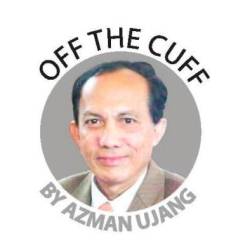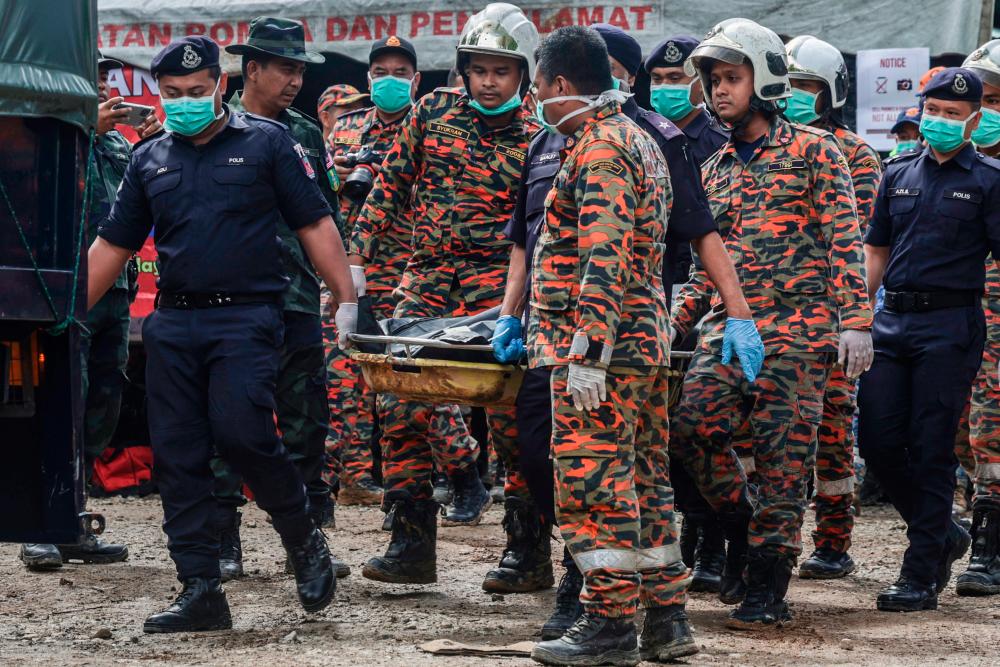IT’S like watching a replay of very old movies on television or listening to songs of yesteryears once again when yet another devastating landslide tragedy struck last Friday, this time at a campsite along the hilly Batang Kali in Selangor.
As of press time, the death toll stands at 30 while 61 victims were rescued and more are still unaccounted for.
Just within close proximity to the latest tragedy, 20 people perished in a landslide on a slip road to Genting Highlands about 27 years ago.
And two years earlier than this, 48 people were killed when one of the three Highland Towers apartment blocks in Hulu Klang near Kuala Lumpur collapsed due to a landslide.
There have been several similar deadly landslide tragedies within the Hulu Klang vicinity and elsewhere in the country since then but what is apparent is that no lessons seem to have been learnt to prevent a recurrence.
Just taking Selangor as an example, plenty of hillslope housing projects have sprouted and the fact they are snapped up by buyers does make one wonder how residents could sleep well living in such precariously looking houses.
And as usual, after such a tragedy there is no lack of experts jumping on the media bandwagon giving their opinions on why and how it happened in the first place as well as who is to blame for what.
A lot of money must also have been spent on conducting investigations each time a repeat tragedy occurred and at the least, public expectation is that the authorities not only act on the findings but are seen to be taking preventive measures at hillslope spots.
By and large, very little, if any, such action appears to have been implemented to mitigate or prevent a recurrence and reports by inquiry panels on the outcomes of such investigations must be gathering dust somewhere.
Social activist Tan Sri Lee Lam Thye, who is passionate about safety, especially among the nation’s workforce, cannot hide his disgust over yet another landslide resulting in such a massive loss of lives.
“We never seem to learn from the bitter lessons of past tragedies whether they are landslides or other tragedies where innocent lives are lost,” Lee told this writer.
As I mentioned earlier, Lee said although investigations were carried out after each tragedy, lessons were not learnt and the tragedies kept on repeating.
Judging by the way the authorities manage tragedies in the country, Malaysians certainly have a very poor safety culture.
“Let’s have a total reset by implementing a disaster prevention culture,” said Lee.
In the case of this latest landslide tragedy, one does not have to be at the actual location to feel how fragile the hillslope is, with the campsite located in the valley below.
And on the hilltop is a highway curve with no metal railings at all to prevent motor vehicles from plunging right into the campsite should the driver lose control.
Watching live television news coverage of the tragedy over the past few days also makes one wonder why the local government authority under which the campsite is located has closed not only one but both eyes to the existence of the campsite.
The victims in this particular tragedy are teachers and staff of a Chinese school who chose to spend the weekend with family members during the current school holidays.
And rather shockingly, it is only after some 450,000 cu m of earth had rained downhill on the campsite that it was revealed publicly for the first time that the facility had been operating illegally all this while.
According to newly minted Local Government Development Minister Nga Kor Ming, the campsite was only granted permission for organic farming and had breached the Street, Drainage and Buildings Act 1974, which provides a punishment of three years jail or a maximum fine of RM50,000.
Nga had also instructed all 155 local councils to close all campsites located near rivers and high-risk areas for a week following weather forecasts of five days of heavy rain beginning last Saturday.
On this matter, many are of the view that it is pointless to close such places for only a week because whether there is a downpour the risk of hillslopes collapsing is just around the corner.
Isn’t it wiser to instead impose a moratorium on further development in all environmentally sensitive areas?
It is safer not to allow any activity at such fragile spots.
I understand from a source that the Malaysian Anti-Corruption Commission is also investigating if there is any hanky-panky involved.
At the end of the day, common sense dictates that people should avoid putting their lives unnecessarily at risk at such spots.
Whatever the outcomes are from the probe on how and why the tragedy took place, no words could possibly describe the loss experienced by families of the ones whose lives could well be saved if lessons from past tragedies were well learnt.
Comments: letters@thesundaily.com










